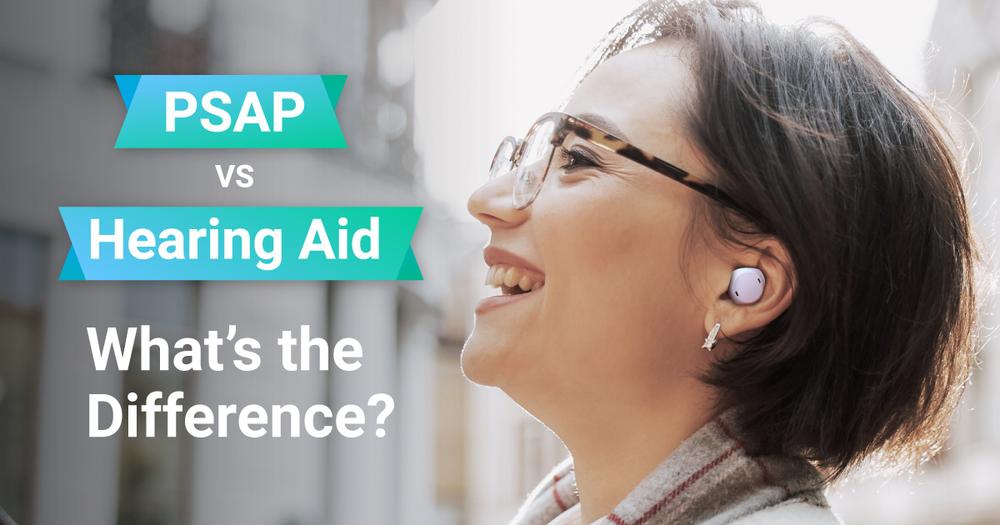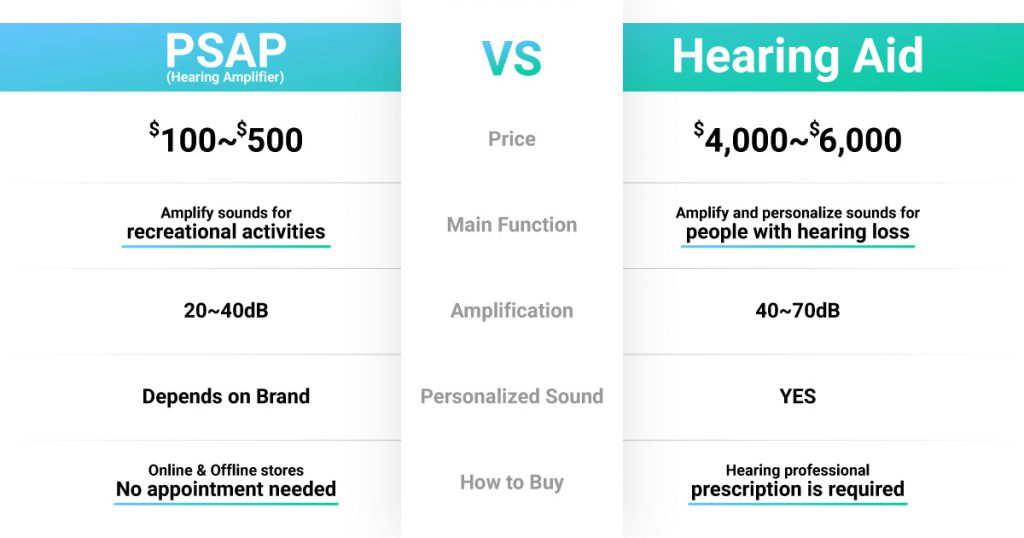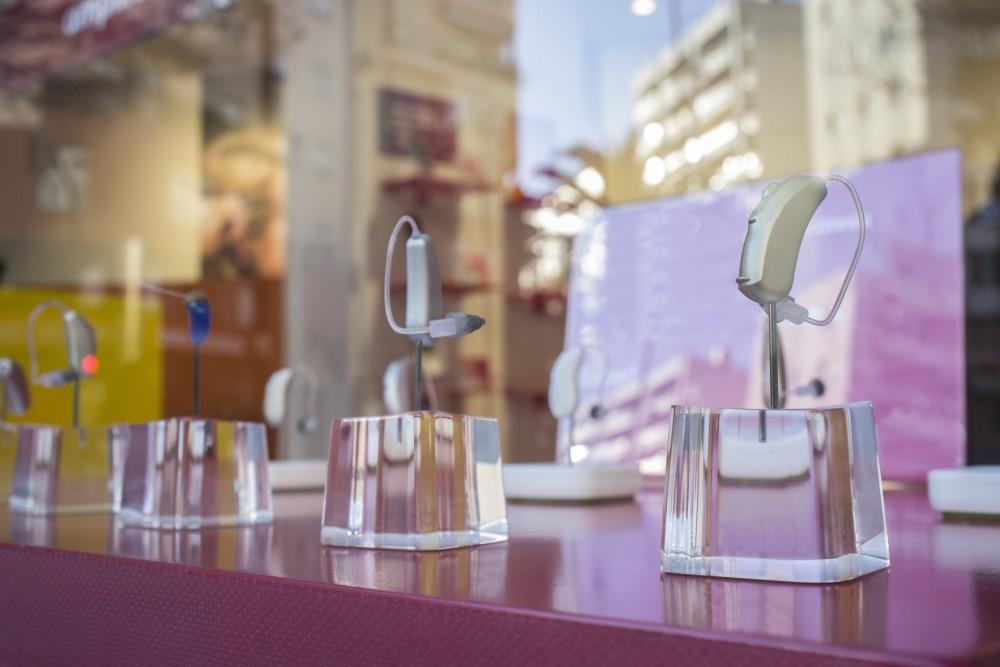
What is a PSAP? Can it replace my hearing aid? If you or a loved one in your family is looking for a hearing device, you’ve probably started to ask questions like this one. There are many hearing aids and sound amplification products on the market, and sometimes it’s hard to tell what is the best for you.
Contents
What is a PSAP? (Personal Sound Amplification Product)
The term PSAP stands for “Personal Sound Amplification Product” and as the name suggests, is a device that utilizes technology to amplify sounds or provide clarity in noisy environments.
Until recently these devices were limited in usefulness and not at all comparable to traditional hearings aids. Recently, however, PSAPs have been rapidly gaining popularity as their improved technology and much lower prices start to blur the previously clear line between them and hearing aids. Improved sound amplification technology, Bluetooth connectivity, and customizable hearing settings are turning PSAPs into a convenient and affordable package for those who are looking to enhance their hearing.
What Are The Main Differences Between a PSAP and Hearing Aids?

1) Price
One of the most common reasons people avoid hearing aids is the price. In addition to the device itself costing upwards of $4000, the tests and examinations by an Audiologist and subsequent fittings and maintenance only add to the cost. In addition, most insurance plans and companies do not cover hearing aids, requiring one to pay completely out of pocket. Conversely, the cost of a PSAP is often only around $100-500 with no required tests or additional fees.
2) Function
While both PSAPs and hearing aids are designed to help with listening, their main function has one critical difference.
- Hearing aids are FDA approved sound-amplifying medical devices intended to compensate for impaired hearing. Specifically, they are Class 1 medical devices that are manufactured and programmed for a person’s specific hearing loss and are distributed by hearing healthcare professionals, such as licensed audiologists.
- PSAPs are not intended to make up for impaired hearing. They are not FDA regulated and can be simply purchased from online or offline retailers like most devices. If you are suffering from hearing loss, then you should see a licensed professional for a hearing test and subsequent recommendation!
3) Accessibility
A hearing aid requires a professional examination and fitting by a doctor or audiologist. Especially at the time of this article’s writing, due to Covid-19 that can be a challenge for many people. PSAPs, on the other hand, can be purchased from the comfort of your home. In addition, some specific models now offer their own hearing tests and customizable hearing settings.
You May Want To Consider a PSAP if…
- You sometimes have difficulty focusing on people’s voices during conversations
- You require a higher volume setting than others on the TV
- You engage in hobbies that may require amplified sound or a boost in volume (bird watching, hunting, movies…)
- You attend lectures and often have difficulty hearing the speaker’s voice.
In addition, there are a large number of PSAPs available on the market today, ranging from cheap basic $30 wear and forget models to $500 hearing profile enabled Bluetooth models!
Our Olive Smart Ear is an example of an affordable yet highly technical PSAP, coming equipped with Bluetooth music & call functionality, a quick 5 min sound calibration for personalized sound settings, and touch functionality among others!
You May Want To Consider a Hearing Aid if…
- You have been medically diagnosed with a form of mild to severe hearing loss by a professional licensed hearing specialist.
- Your hearing loss negatively affects you in day to day situations and impedes your life.
- You wish to protect yourself from further hearing loss, as not addressing hearing loss can lead to higher and higher volumes required to continue hearing, further damaging one’s ears.
Hearing Aids comes in a variety of models and designs – finding one that both fits well and you are comfortable with is a very important decision. For some more information on the different types of hearing aids, please check out our article here!
For those considering a Hearing Aid for mild to moderate-severe hearing loss, our Olive Pro is a special 2-in-1 Hearing Aid & Stereo Bluetooth Earbuds. The first of its kind, we’ve combined a FDA registered medical device with a HiFi music listening device for a single, sleek and stylish solution to the stigma and high cost of traditional hearing aids!
Alternative Solutions to PSAPs and Hearing Aids
Aside from PSAP’s and Hearing Aids, there are alternative options available as well!
- Cochlear Implant: A surgically implanted device that can partially restore hearing by mimicking the damaged sensory hair cells inside the inner ear. These devices can restore hearing beyond the hearing loss levels of hearing aids.
- Bone Conduction Hearing Devices: These devices deliver sound directly through the bones by means of vibrations.
- OTC Hearing Aids: Following a 2017 US bill, a new classification of hearing aids was signed into law. OTC (Over-The-Counter) hearing aids are designed specifically for mild-to-moderate hearing loss and will be regulated by the FDA as medical devices. For more information, check out our OTC Hearing Aids article!
As you can see, technology has advanced to offer many more options for those looking for new hearing experiences. With more affordable options outfitted with greater technology, these products can give you the sound boost you need in a format and price tag that’s right for you.
If you enjoyed this article, check out our blog “The Olive Branch” for more information on sound and hearing!
The information in this guide has been written using the following reliable sources:
https://health.clevelandclinic.org/otc-hearing-aids-are-coming-but-theyre-not-for-everyone/
https://www.consumer.ftc.gov/blog/2018/05/ftc-sound-amplifier-not-hearing-aid








